- Home
- Rachel Ford
Eye for an Eye (An Owen Day Thriller)
Eye for an Eye (An Owen Day Thriller) Read online
Eye for an Eye
An Owen Day Thriller, Book 3
By Rachel Ford
Chapter One
As states go, I like Wisconsin plenty. It’s got all the right elements of a life well lived: open spaces, massive forests, ancient lakes, sprawling fields, and obscene amounts of cheese. I don’t say that lightly, either. Cheese is a part of Wisconsin culture to an almost unhealthy degree. Which isn’t a complaint. It’s a highlight of visiting.
These are people who sell – and actually wear – hats made to look like cheese, to show support for their football team. They’re the cheeseheads.
You can’t throw a stick without hitting a cheese shop in Wisconsin. Yes, you read that right: a cheese shop. As normal as coffee shops, or shoe stores, or grocery stores or liquor stores (and there’s plenty of those, but I’ll get to them in a minute).
We were in a little town in the center of the state, very near the exact geographic center, called Marshfield, when I saw the most Wisconsin of all Wisconsin things: a cheese shop with a drive through window.
Because, you know, sometimes you need your cheese in a hurry.
It would be a mistake to stereotype the state as mere cheese fanatics, though. They love their beer almost as much. If your town has more than two traffic lights and a gas station, there’s a real possibility that there’ll be a brewery, too.
And I’d be remiss to mention the abundance of churches and bars – usually, about a block from each other, but sometimes right across the street. There seems to be an unwritten rule of ratios in most Wisconsin small towns. 1:1 is the magic number. You need one bar for every church.
Or maybe it’s one church for every bar. Whatever, there are lots of bars, and lots of churches. And lots of liquor stores, too. Just in case the bar scene isn’t for you.
And there’s lots of cows. That’s another thing about Wisconsin: the agriculture. There’s about one cow to every five people in the state.
But Wisconsinites do more than raise cows. They raise llamas and goats and chickens and pigs. They have fish hatcheries and poultry farms. Basically, if you can roast it, boil it, fry it, smoke it or grill it, Wisconsin grows it.
And not just animals. They have all kinds of crop farms too. There’s corn and soybeans, of course, but just about everything else too, from the squash families to legumes. There’s orchards and cranberry farms. Marathon County, in Central Wisconsin, grows most of the ginseng in the United States, and ten percent of the world crop.
And they’re exceedingly proud of their agricultural roots. Marshfield – the place with the cheese drive through – boasts of having the largest round barn in the world.
Seriously: it’s on Wisconsin travel websites. And it is exactly what the name implies: a big round barn.
Which is evidence that you should really run your marketing materials past someone else before hitting publish, to make sure you’re marketing to the general public and not just yourself.
Because I can’t imagine anyone outside of Wisconsin planning a trip over a barn. “Ohh, add that to our itinerary, honey: we can’t miss the world’s largest round barn!”
Then again, what do I know? I’m only here because my niece decided she had to see a place called Random Lake. Yes, that’s a real place. No, really, it is: google it.
Which is the other thing about Wisconsin.
They’re smart people, talented people, industrious people. They’ve been farming and building and brewing and logging and cheesemaking for years. But – and I say this with the utmost respect – they’re shit at naming things.
It’s like they don’t even try. Like they just gave up. Like the one-man naming and planning committee of every town across the whole damned state got up at the crack of dawn to take care of the cows, and worked for another twelve hours in the fields, drank a six-pack after dinner, and then remembered, “Oh, that’s right, I’ve got a map to work on.”
I don’t know how else to explain why there’s a Cherry Avenue, or Cherry Street, or Cherry Lane in every town I’ve been to in Wisconsin. Or why there’s not just one, but multiple lakes, called Mud Lake, or so many gravel roads called Gravel Lane.
That simplicity is exactly what caught my niece Maisie’s eye. As soon as she found out there was a place called Random Lake, Wisconsin, she had to go.
And so here I am. In the dairy state. Camping.
It was the second of July, and the sun was bright and hot. The kids – Daniel Emerson and Maisie Ryder – had spent the last three hours swimming. Now, we were eating tacos by the water, that we’d bought from a food truck in the parking lot.
As a rule, I didn’t buy food from any kind of vendor that could speed off and disappear after selling said food, but these were alright. The kids certainly seemed to enjoy them. I hoped we wouldn’t regret it later.
“Do you know that the largest wooly mammoth ever found was found in Wisconsin?” Maisie asked. Maisie was ten, and outgoing and whip smart for her age.
“That’s very cool,” I said.
“Who cares?” Daniel asked. “And no one says cool anymore, Uncle Owen.”
Daniel was nine, going on thirteen. Or so it seemed, anyway. He’d been moody and temperamental the entire trip. The charms of the dairy state had yet to impress.
“It’s at the Milwaukee museum,” she went on.
“Well, maybe we should go there,” I said.
Daniel rolled his eyes. “Great.”
“Did you know Wisconsin has the world’s largest cranberry festival?” Maisie asked.
“I did not,” I said.
“Who cares?” Daniel asked.
“Daniel,” I said. “Be nice to your sister.”
He sighed. “She’s boring.”
“What, I should be sitting there saying nothing, like you?” she asked.
“Yes,” he said.
“Come on,” I said. “No fighting.” I was sorely, sorely regretting being talked into this by my former sister-in-law. Not that I didn’t like the kids.
I did. They were good kids – the oldest two, anyway. Ben, the youngest, was something of a walking nightmare. He had been the apple of both of his parents’ eyes since he was born. And since my brother died, things had only gotten worse. Ben could do no wrong, ever.
But Megan, the ex-sister-in-law, had taken Ben with her – with her, and her new boyfriend, Michael. They’d gone to Disneyland. Or maybe it was Disney World – whatever they called the one in Florida.
They’d gone with Michael’s kids from his first marriage, a set of twin girls who were close to Ben’s age. Which had apparently been part of the reason they decided Maisie and Daniel would be better off with me. The younger kids would have more fun together.
As for Mais and Daniel? “They’re too old to really enjoy it like Ben and the twins.”
I didn’t buy that. Not for a second. But Megan’s mind was made up, and it was either send the kids to their grandparents to do nothing for a week, or figure out where to go and what to do.
Which is how we’d wound up in Random Lake. The kids had flipped a coin to decide who got to pick where we went. Maisie had chosen heads and won the coin toss. And she’d picked Random Lake.
Daniel hated the idea, but I think he would have hated anything short of Disney World. So here we were: Maisie, loving every minute of it, and Daniel, despising every second.
“Where are we going for dinner?” I asked them.
“I don’t care,” Daniel said.
“I want a burger,” Maisie said.
“Let Daniel pick. You picked last night.”
She shrugged, and he said again, “I don’t care.”
“Well, think about it,” I sai
d.
“Whatever.”
We went back to our tacos for a space. Then Maisie said, “Did you know the first ice cream sundae ever was made in Wisconsin?”
Daniel glanced up, interested. It lasted for about a second, before he looked away. But I noticed anyway.
“You know,” I said, “I could sure do with an ice cream sundae myself. Following local traditions: when in Rome, and all that…”
Daniel rolled his eyes at me but didn’t argue.
Maisie grinned. “Me too.”
“Okay. So whatever we eat, we have to get ice cream afterwards.”
They accepted that readily enough. My next suggestion met with less approval. “You guys want to hit the trails?” We had a site at one of the Kettle Moraine state forest campgrounds, in the North Unit. There were trails all over the place, some of them mild, and some less so.
I liked walking better than baking in the sun, especially at a popular lakefront. And Random Lake was popular. Every time I glanced around, more people seemed to have shown up. Which was a problem for me, but not the kids.
They didn’t want to hike.
“How about a bike ride?”
Maisie shrugged. “I guess.”
“I want to swim,” Daniel said.
“Well, we could go out to the big lake afterwards,” I offered. I certainly wasn’t above a little judicious bribery. Random Lake was maybe twenty minutes away from Lake Michigan, and another state park, and another beach.
Maisie nodded eagerly, and Daniel shrugged. But it wasn’t a hate-shrug. I’d come to know the difference in the two days we’d spent together so far.
He had a neutral shrug, for when he really didn’t care one way or the other. That was not to be confused with the more emphatic hate-shrug, deployed when he vehemently opposed something; or the affirmative shrug, the one he used when he approved, but couldn’t acknowledge it.
Because he hated the entire trip, and everything about it, and couldn’t possibly like anything. Even when he really did.
This was the approval shrug.
“Okay. Bike ride, then Lake Michigan, then ice cream: that’s the plan.”
An hour and a half and an aborted bike ride later, we were back in the car – tired, sweaty, and a little out of sorts. The day had been too hot, the mosquitoes too hungry, and the trails too busy.
None of us had a good time.
So we were heading to Lake Michigan. I set Harrington Beach State Park as our destination in my phone’s map application, and followed the navigation cues.
The app took us through a few turns until we got onto Jay Road, which we would follow for a lengthy stretch before taking a few more turns and winding up at the state park.
We’d driven through farm country around Random Lake, with great, rolling hills rising high and dropping low. Fields lined the road in every direction, and quaint farmhouses sat atop stoic rises.
But the wetlands and Kettle Moraine Forest areas were different. Jay Road was different – very different.
It was flatter for starters, with fewer farms along the way. Sometimes, there were no farms at all: just dark, forested patches, where half-dead trees jutted up along the roadside in green swampy waters that rose so high they nearly touched the pavement.
The picture-perfect heartland felt a million miles away amid this dank swampland. Daniel wanted to know why the water was green. Maisie decided the place must be haunted. “I’ll bet there’s ghosts in here.”
Daniel scoffed at his sister. “There’s no such thing as ghosts.”
I let them argue it out among themselves. At least they were both talking, and both engaged with something other than being tired and miserable.
We drove on for a stretch through shadowy forest road. Then, I tapped my brakes. Up ahead, half on the roadway and half in the swamp, was a long, dark bundle. At first glance, it looked like a black or forest green duffel bag, like maybe some unlucky camper had lost their luggage.
But the proportions were off. This thing was almost six feet long, and bulky at one end and thinner at the other. I knew within about two seconds what I was looking at.
The kids didn’t. They both spotted it about the same time I did. Maisie had sat in the passenger seat and was riding shotgun, and Daniel took a seat behind me. They could both see out the windshield, and right now they both craned their necks to get a view.
“Is that a bag?” he asked.
“What is that?” she asked.
It was a body, wrapped in a dark green tarp. A human body. But I didn’t tell them that. I said, “Not sure.”
I hit the brakes and threw a glance in the rearview mirror. The road stretched out endlessly behind us – empty. There was no one ahead, either. I checked the sides and saw nothing: no dark shapes lurking among the trees, no figures tromping through the slimy green waters, no boats or rafts. No hidden killers anywhere.
Just emptiness, in every direction.
I put the SUV in park, and said, “I’m going to go take a look. You both stay in the vehicle, okay?”
“What is it, Uncle Owen?” Maisie asked.
“I don’t know,” I lied. “I’m going to check it out. I’ll be right back.”
I stepped out into the hot July day. The sun beat down angrily through the narrow gap in the trees, heating the blacktop until it was almost sticky as I walked over it. The humidity hung heavily in the air, thicker than it had been back at our campgrounds.
I could hear nothing at all other than the engine – no birds, no insects, no signs of life.
I checked our surroundings again. Nothing had appeared in the last ten seconds. Then I moved for the body.
I could see more as I neared it. It was indeed a tarp. The bundle had been secured with three separate lengths of rope, spaced equally around the figure.
A quick job, by an unfamiliar hand. It left both ends open, and, with a little effort, open to inspection. I couldn’t see what lay inside at a glance, but it’d be no trouble to find out.
Which is what I did. I knew what I’d find, but I was going to have to call the cops. Better not to approach them with guesses. Better to have facts.
I glanced around for something to manipulate the tarp without touching it – without adding my own prints or smudging the killer’s. Pickings were slim, but in a moment I spotted a ragged, half rotted branch at the edge of the green water a few yards away.
One end was slimy with water and algae. The other had dried from long exposure to the brutal July sun. I held the slimy end, so I didn’t contaminate the body, and shifted the tarp with the dry one – shifted it, pulled, pried and generally fought until I could wrestle open a gap large enough to glimpse what lay inside.
And there it was: a human body. I could see the upper portion of a man’s face, broad and pale, with a full head of red hair – and a dark hole in the center of his forehead.
Probably not an accident, then. Someone had shot him, and they’d shot him squarely between the eyes. It was either an execution, or the luckiest accidental shot in the history of shots.
My money was on an execution.
Then again, the hasty wrapping and haphazard disposal spoke to an inexperienced killer. Not someone who planned any kind of ceremonial or symbolic death.
This was someone who panicked, threw a tarp over the victim, drove them out to somewhere remote, and dumped them. They didn’t even bother getting the body into the swamp, where it might have sunk and disappeared from sight.
They just dropped it and ran.
Which seemed like a glaring contradiction to me. If you’ve got time to plan an execution, why skimp on the extra seconds to hide the body?
Of course, murder wasn’t always a rational business. It didn’t always involve meticulous planning and devious scheming. Maybe it had been an execution, but a spur of the moment one: flaring tempers, angry, split-second decisions.
Maybe liquor had been involved. Maybe the dead guy said something someone thought he shouldn’t have, or walked
in on something he wasn’t meant to see. Someone pulled the trigger to handle the immediate crisis.
And then, when it was over, the panic set in. The killer had to be rid of the body, as soon as possible, like making it disappear would somehow free him of what he’d done.
Then again, there was a simpler explanation. Most people who got into the murder business were morons. For all the masterminds you saw on television, for all the killers whose devious schemes haunted public imagination for decades, there were thousands – tens, probably hundreds of thousands – who were apprehended within hours or days of their crimes.
So maybe the killer hadn’t panicked. Maybe he was just a moron, who had tried to dump the body, failed, and left it alone.
But whatever – it didn’t matter much to me. I didn’t have to build a profile of the guy, or solve the case. I just had to call the cops. So I started to shift the tarp again, to set it back in place, when I heard Maisie’s voice.
“Is he…dead, Uncle Owen?”
Chapter Two
Maisie and Daniel had both followed me. They were both standing on the blacktop, staring at the body with wide eyes and gaping mouths.
“Son of a…what the hell are you doing out here?” I asked, catching myself on the first curse just to slip on the second.
“Is that a zombie?” Daniel asked.
Maisie shot him a supercilious look. “Zombies aren’t real, dummy. He’s dead. Someone killed him.”
“Language,” I said. “And he’s not dead. He’s…”
“A zombie?” Daniel supplied.
“Waiting for an ambulance,” I said.
Maisie made a face. “He’s dead, Uncle Owen. I know he’s dead.”
“You shouldn’t be out here.”
I headed toward them, gesturing for them to get into the vehicle. “Get back inside.”
“I want to see,” Daniel said. “I never got to see a dead body before.”
“Yes you did,” his sister reminded him. “You saw dad, remember?”
This was going off the rails fast. The last thing I needed was Daniel dwelling on his father’s – my brother’s – murder. So I adopted a sharp tone, and said, “Inside. Now.”

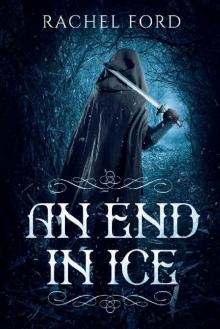 An End in Ice
An End in Ice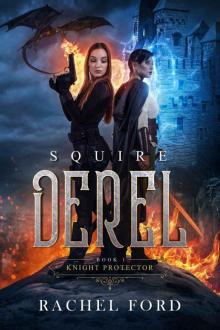 Squire Derel
Squire Derel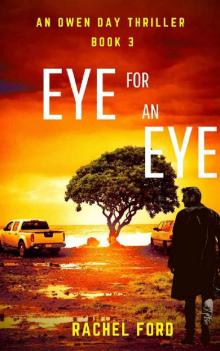 Eye for an Eye (An Owen Day Thriller)
Eye for an Eye (An Owen Day Thriller)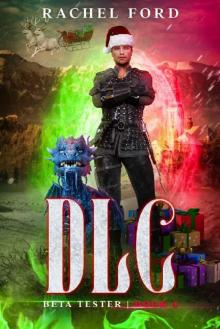 DLC: A LitRPG Adventure (Beta Tester Book 4)
DLC: A LitRPG Adventure (Beta Tester Book 4)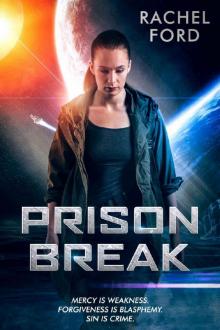 Prison Break
Prison Break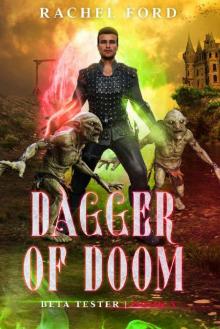 Dagger of Doom: A LitRPG Adventure (Beta Tester Book 5)
Dagger of Doom: A LitRPG Adventure (Beta Tester Book 5)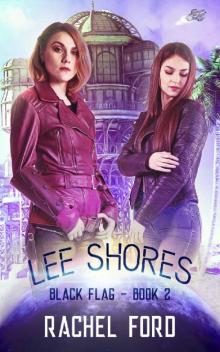 Lee Shores
Lee Shores Viper's Nest
Viper's Nest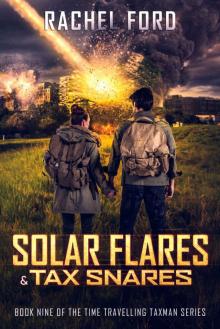 Solar Flares & Tax Snares
Solar Flares & Tax Snares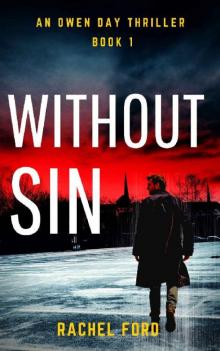 Without Sin (An Owen Day Thriller)
Without Sin (An Owen Day Thriller)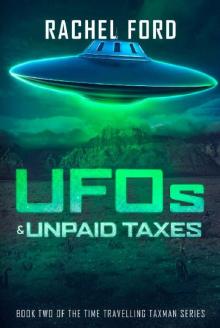 UFOs & Unpaid Taxes
UFOs & Unpaid Taxes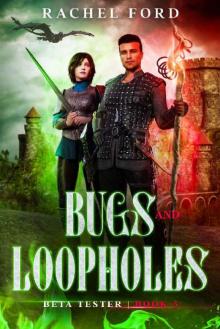 Bugs and Loopholes: A LitRPG Adventure (Beta Tester Book 3)
Bugs and Loopholes: A LitRPG Adventure (Beta Tester Book 3)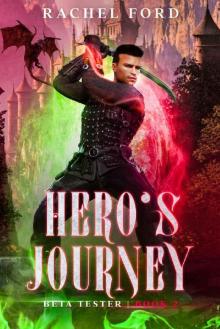 Hero's Journey: A LitRPG Adventure (Beta Tester Book 2)
Hero's Journey: A LitRPG Adventure (Beta Tester Book 2)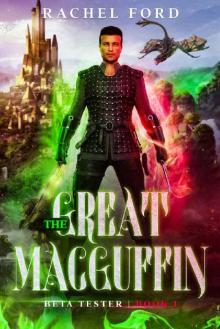 The Great MacGuffin: A LitRPG Adventure (Beta Tester Book 1)
The Great MacGuffin: A LitRPG Adventure (Beta Tester Book 1)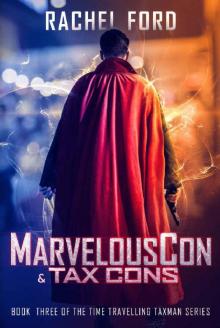 MarvelousCon & Tax Cons
MarvelousCon & Tax Cons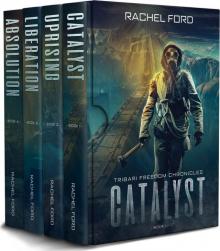 The Tribari Freedom Chronicles Boxset
The Tribari Freedom Chronicles Boxset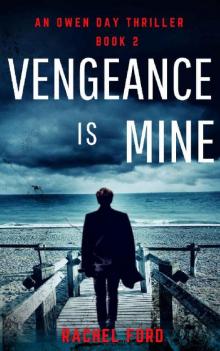 Vengeance Is Mine (An Owen Day Thriller)
Vengeance Is Mine (An Owen Day Thriller)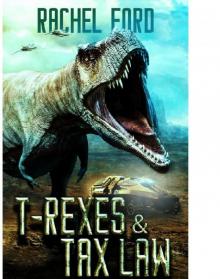 T-Rexes & Tax Law
T-Rexes & Tax Law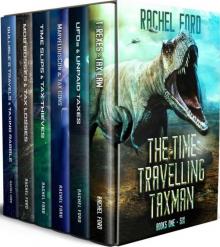 The Time Travelling Taxman Series Box Set
The Time Travelling Taxman Series Box Set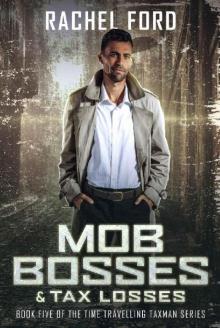 Mob Bosses & Tax Losses
Mob Bosses & Tax Losses